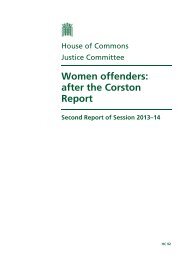Listen Up - Social Welfare Portal
Listen Up - Social Welfare Portal
Listen Up - Social Welfare Portal
You also want an ePaper? Increase the reach of your titles
YUMPU automatically turns print PDFs into web optimized ePapers that Google loves.
listenup!96 | Case Study 3Case Study 3:Community Links, Canning TownMission statement“Our founding philosophy is empowerment and abelief that everyone who receives has something togive in return.”Overview of the serviceCommunity Links was founded in 1977 and is ageneric children and young people’s organisationthat delivers an extensive network of projects andservices to over 1,000 16-25 year-olds each weekacross East London. The project was first establishedby two youth workers, Kevin Jenkins OBE andDavid Robinson OBE, who identified the need for abroader range of opportunities for young peopleand more community-led initiatives in the localarea. Subsequent growth of the project has beendetermined by the needs and demands of youngpeople in the local community and in consultationwith them. Funding throughout the history of theservice has come from various sources, includingNewham Council, trusts, private companies and localcommunity fundraising.The community focus of the project means thatmuch of the mental health work it carries out ispreventative. Generic advice, advocacy and supportservices are provided to help young people copewith situations, such as unemployment and familybreakdown, that could potentially lead to mentaldistress. Outreach projects also form a large part ofthe service, for instance carrying out mental healthpromotion work in local schools, and working withyoung people in custody. More traditional mentalhealth support is also offered, in the form of one-toonecounselling and structured group work focusingon particular issues, such as bereavement or selfharm.For those experiencing distress/crisis a largevariety of services are available including: drop-in;support with attending other services; intensivesupport over 24–48-hour periods; and childcare.Accessibility is considered key, and the service can becontacted by text, phone or email.Central objectives of the work carried out are toempower young people, to facilitate equality ofaccess, to combat stigma and to provide servicesthat are responsive and useful to young people’sactual needs. Peer support and mentoring aretherefore central to the project and many youngpeople who first access the project for help go on tosupport other young people in the future.Service development work carried out as part ofthe Mental Health Foundation projectCommunity Links have recently set up a textmessaging service which complements the e-mailand telephone helplines they already have. The serviceenables a young person to text the service and themessage is relayed via a computer. This means thatstaff can type a response to the young person andthis will go their mobile. The helpline is manned everyweekday and Saturday mornings but is often checkedmore frequently. This service provides another wayfor young people to access and test out the service.It may be easier for a young person initially to makecontact via text rather than having to speak tosomeone, which can be more daunting.Mental Health Foundation funding was also used forthe initial release of staff at Community Links, whodid not work specifically with young people withmental health problems, to have training to increaseawareness and knowledge. Child and adolescentmental health services provide the training and theaim is to help those staff gain a better understandingof young people’s emotional and mental healthneeds. This in turn improves the first contact a youngperson may have with the service. At the time ofgoing to press, Community Links had taken overfunding this work so it can continue.
















